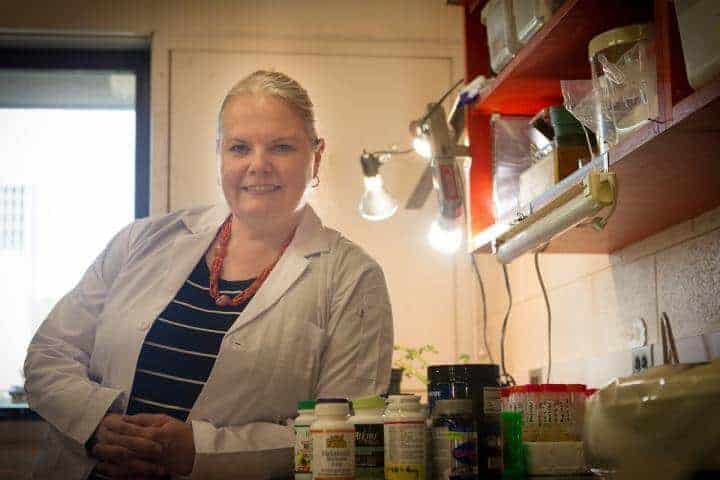A dietary supplement containing a blend of thirty vitamins and minerals–all natural ingredients widely available in health food stores–has shown remarkable anti-aging properties that can prevent and even reverse massive brain cell loss, according to new research from McMaster University.
It’s a mixture scientists believe could someday slow the progress of catastrophic neurological diseases such as Alzheimer’s, ALS and Parkinson’s.
“The findings are dramatic,” says Jennifer Lemon, research associate in the Department of Biology and a lead author of the study. “Our hope is that this supplement could offset some very serious illnesses and ultimately improve quality of life.”
The formula, which contains common ingredients such as vitamins B, C and D, folic acid, green tea extract, cod liver oil and other nutraceuticals, was first designed by scientists in McMaster’s Department of Biology in 2000.
A series of studies published over the last decade and a half have shown its benefits in mice, in both normal mice and those specifically bred for such research because they age rapidly, experiencing dramatic declines in cognitive and motor function in a matter of months.
The mice used in this study had widespread loss of more than half of their brain cells, severely impacting multiple regions of the brain by one year of age, the human equivalent of severe Alzheimer’s disease.
The mice were fed the supplement on small pieces of bagel each day over the course of several months. Over time, researchers found that it completely eliminated the severe brain cell loss and abolished cognitive decline.
“The research suggests that there is tremendous potential with this supplement to help people who are suffering from some catastrophic neurological diseases,” says Lemon, who conducted the work with co-author Vadim Aksenov, a post-doctoral fellow in the Department of Biology at McMaster.
“We know this because mice experience the same basic cell mechanisms that contribute to neurodegeneration that humans do. All species, in fact. There is a commonality among us all.”
In addition to looking at the major markers of aging, they also discovered that the mice on the supplements experienced enhancement in vision and most remarkably in the sense of smell–the loss of which is often associated with neurological disease–improved balance and motor activity.
The next step in the research is to test the supplement on humans, likely within the next two years, and target those who are dealing with neurodegenerative diseases.
If our reporting has informed or inspired you, please consider making a donation. Every contribution, no matter the size, empowers us to continue delivering accurate, engaging, and trustworthy science and medical news. Independent journalism requires time, effort, and resources—your support ensures we can keep uncovering the stories that matter most to you.
Join us in making knowledge accessible and impactful. Thank you for standing with us!


It would be very helpful if the authors of ScienceBlog would post a link to the original paper with each of these news reports, for those of us who’d like to learn more and read the original literature.
Thanks,
KCS
Good for the mice, but it’s highly unlikely that this will pan out for people. Mouse models have been distressingly useless for finding therapies for neuropathologies. Likely one of the reasons is that mice have, well, mouse brains. :-)
And in this case we don’t even know what it is about the supplements that would cause the mouse brain to regenerate its tissue so extensively. (I’d surely like to see this research replicated elsewhere.)
I am a Laurentian University professor still teaching and doing research at age 69 (70 coming up quickly!). I experience frequent short term memory loss that is increasingly problematic in the middle of a lecture or even a conversion. I am multilingual and this can be troublesome there as well. I also play both the violin and viola and find that I now will get confused when switching between clefs and fingering patterns on the different strings. I may forget if I have taken my pills! I do know that I suffer from microangiopathic changes to the brain which has been explained to me but this is very worrisome nevertheless. I hope to be able to improve my cognitive abilities and have recently started seeing a neurofeedback therapist to help me with whatever they can do with that technology. I would be more than happy to be a subject when you do human trials on this product. My ancestry is Irish if that is of an help. My husband, a retired circuit judge of 76, would also be interested. He is still very active in the community and over the past ten years has founded and supervised a free medical clinic for poor villagers in his native India.